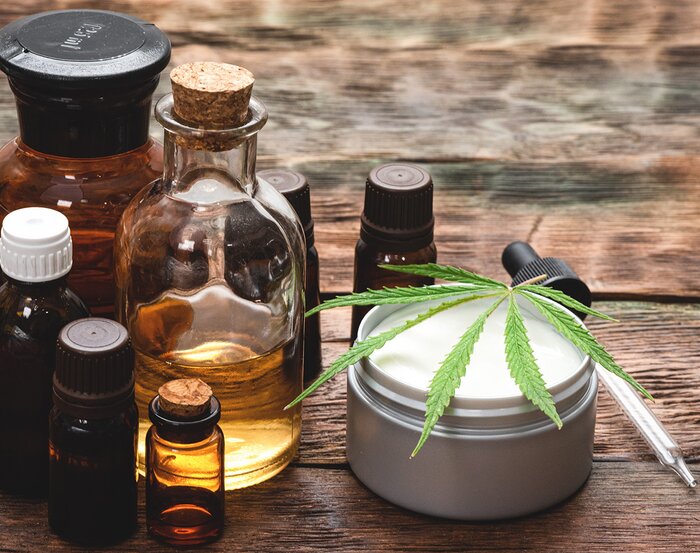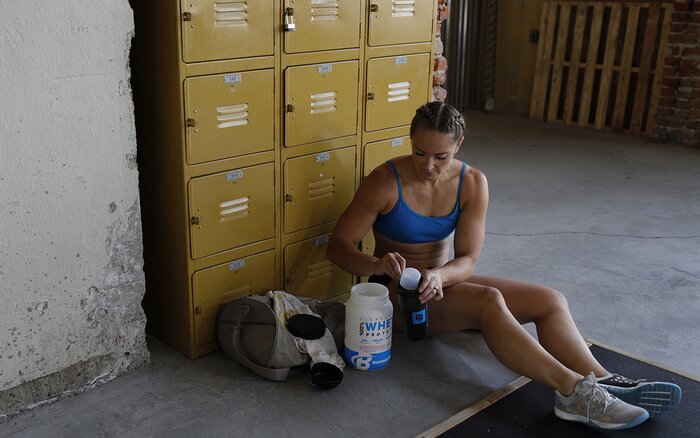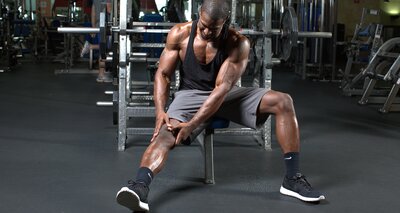If you follow top strongmen, powerlifters, bodybuilders, and CrossFitters on social media, you've probably already seen them post pictures of vials, droppers, or CBD creams, or talk about how and why they use CBD. It's rapidly joined protein and carbs as part of many athletes' post-workout recovery regimen, and many say it has helped them control post-workout muscle soreness and improve their overall workout recovery, particularly during intense training phases.
But like any other supplement, CBD works best when you know why, when, and how to take it. Here's what the current research says about CBD and muscle recovery.
What is CBD?
Cannabidiol, or CBD, is a naturally occurring chemical compound found in the Cannabis sativa plant. CBD is made up of the exact same atoms as tetrahydrocannabinol (THC), a psychoactive chemical compound found in the same plant, but in a slightly different arrangement. The difference seems minor, but it has a major effect: THC substances leave you feeling "high," whereas CBD can have beneficial effects on the body without the same sensation.
CBD products are made using the CBD oil extracted from industrial hemp plants, which is usually mixed with a carrier oil such as coconut or hemp seed. These extracts can be taken several ways: as a topical cream, in capsules, or in drops placed under the tongue.

However you take it, CBD works with the body's endocannabinoid system (ECS), specifically the cannabinoid receptors CB1 and CB2. These help regulate a number of things, such as relaxation, appetite, and immune system responses.
Muscles and CBD: What the Research Says
Plenty of factors can contribute to post-workout muscle soreness. Maybe you used more weight than you had previously, increased the workout volume, or performed muscle-building intensity-boosters like dropsets or giant sets. All of these can inflict microscopic damage to your muscles, leaving you sore, stiff, and not particularly excited about training again for several days.
There are ways to control and limit this delayed-onset muscle soreness (DOMS) both before and after your workout, ranging from doing a more thorough warm-up to doing some low-intensity cardio. Certain supplements, such as HMB and fish oil, have also been shown to help control exercise-induced soreness.*
Research about CBD and DOMS is limited for now, but at least one study has shown promising results. A study in the International Journal of Physical Education, Sports and Health found that trained athletes who took CBD post-workout recovered more quickly and also reported significantly less muscle soreness at 24, 48, 72, and 96 hours post-workout. The researchers' conclusion was that "CBD appears to have a significant influence on muscle soreness associated with EIMD [exercise-induced muscle damage] DOMS when consumed immediately after strenuous exercise."
Other studies have concluded that CBD has potential value in improving athletes' sleep quality. Sleep has been shown in numerous studies to have a positive impact on muscle recovery—and a negative impact if you're not getting enough of it.
How to Use CBD for Workout Recovery
Like every other supplement, the best approach is to start by following the instructions on the label of the specific product you're taking. Consider taking it alongside your protein shake immediately post-workout, which was the timing recommendation in the CBD and DOMS study. Then take it again later in the day or the next day, as needed.

For those taking CBD in oil form, it is generally recommended to use the dropper provided and place the oil under the tongue. Allow the oil to sit for 30 seconds, because the oil is absorbed through the mucous membrane under your tongue, which is filled with a dense network of capillaries, allowing the CBD better access to your bloodstream.
Balms, creams, and roll-on products are ideal for rubbing on post-workout, or later in the day. Use as you would any other lotion and massage in small circular motions; the skin contains ample ECS receptors that interact with CBD.
Is CBD Safe for Athletes?
Although CBD is considered safe, there are a few considerations to make before using it.
For one, the CBD industry is relatively new and there has been little longitudinal research performed on the botanical because it has only been legal since the 2018 Farm Bill was enacted. Though CBD has not been shown to be harmful, the FDA states that there may be mild side effects, such as changes in digestive function, drowsiness, dry mouth, and appetite fluctuations, among others.
CBD is legal in the United States and is no longer on the World Anti-Doping Agency's banned substance list. But there are some caveats that drug-tested athletes should keep in mind. Some CBD products on the market contain both CBD and THC. CBD sourced from hemp, a plant with lower than 0.3 percent THC, is legal in all states. But CBD sourced from plants with higher THC levels is still illegal in some places, and THC remains banned by WADA.
For all these reasons, it's a good idea to buy your CBD products from a reputable vendor that demands third-party testing with all their products so you can be assured of the potency, purity, and safety of the product.
*These statements have not been evaluated by the Food and Drug Administration. This product is not intended to diagnose, treat, cure, or prevent any disease.

